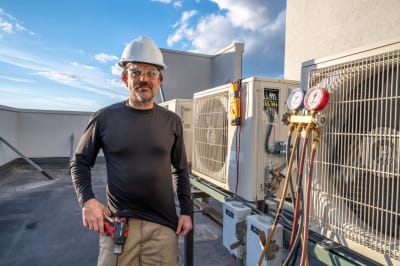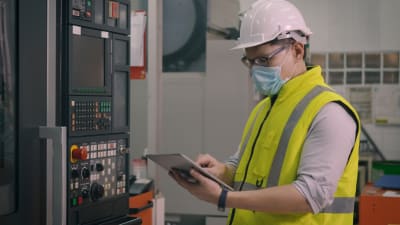Chicago, Illinois, offers a straightforward process for aspiring HVAC technicians in the city to begin their careers and start taking on installation and repair contracts.
Of course, a few steps are involved in this process, but none of them should cause you a great deal of headaches. However, The most crucial step is choosing a notable training program.
This step is problematic not because there are no worthwhile options to choose from but because there are quite a handful of options, all of which have unique benefits.
Below we look at some of the very best of these options and provide a quick overview of what to expect from them to help make your decision easier.
How to Become an HVAC Technician in Chicago
The path involved in becoming an HVAC technician in Chicago includes graduating from High School or having a GED. It also includes enrolling in a training program afterward, either a college/vocational school program or an apprenticeship program.
Both options are valid and are enough to allow candidates to qualify for licensure (needed to secure employment and start practicing professionally).
It is also worth noting that Illinois licensure is not enforced statewide but left to cities and municipalities. For Chicago, licensing requirements for an HVAC technician depend on the value of the contract in question.
Top HVAC Technician Schools in Chicago, Illinois
Now that you know what’s required to become an HVAC technician in Chicago, below are some of the most notable programs in and around the city.
1. HVAC Technical Institute
Accredited by the Commission of the Council of Occupational Education and HVAC Excellence, HVAC Technical Institute – established in 1994 – is one of the premier destinations for future HVAC technicians in Chicago and all across the state.
Students here are brought up in a seven module-approach, which includes chapters on electricity, heating, essential air conditioning, advanced air conditioning, ventilation and installation, and hydroponics.
Another highlight of the program can be found in the last month of the modules, which deals with career readiness, showcasing the program’s emphasis on ensuring that students are not just technically sound but are absolutely ready for whatever the job may throw at them.
Moreover, students who complete this program qualify for an EPA 608 universal license and an R-410A safety certification.
2. Elgin Community College
Elgin Community College, just outside of Chicago, is another institution where students can acquire a high level of HVAC technology training that ensures competence and a straightforward path toward employment after graduation.
Here, students can choose between an associate degree program and a handful of certificate programs. The certificate programs include the sheet metal mechanics certificate, light commercial HVAC service technology certificate, and residential HVAC service technician Certificate, among others.
For the associate of applied science program, students must complete 62.5 credit hours focusing on air conditioning and refrigeration, basic sheet metal, basic electricity, blueprint reading, residential and commercial air conditioning, and more.
3. Coyne College
Coyne College’s HVAC technology program aims to produce successful graduates who excel in heating, ventilation, air-conditioning, and refrigeration. The school seeks to separate itself from the pack by focusing on individualized training administered by experienced professionals.
Accepted students will learn how to operate, install, service, and troubleshoot a wide range of domestic and commercial HVAC systems.
The program can be completed in a matter of 42 weeks. During this time, students learn vital topics such as introduction to mechanical refrigeration systems, commercial controls and applications, gas heating, and introduction to electrical servicing.
4. College of Lake County
At the College of Lake County, students enjoy a highly rigorous training program focusing on both classroom training and hands-on sessions.
Accepted applicants may go for the associate of applied science degree in HVAC Engineering Technology or any one of seven certificate programs which include a Commercial Refrigeration Technician certificate program, a Residential Air Conditioning Technician certificate program, a Residential Energy Auditing Certificate program, and the Residential Heating Technician certificate program, among others.





